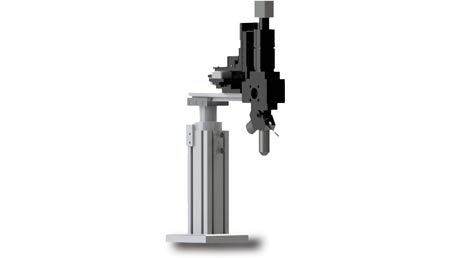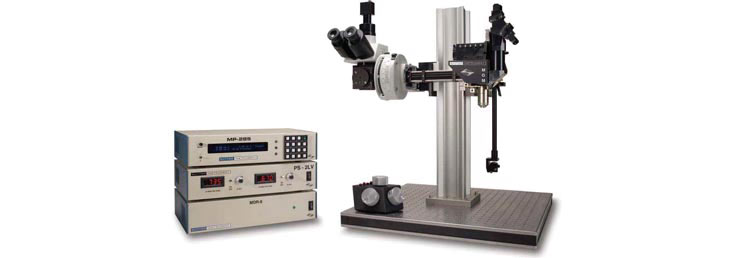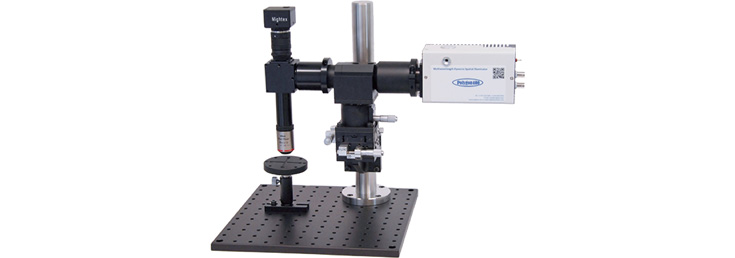
SOM
- Based on MP-285/MPC-385 Motorized Micromanipulator
- X, Y and Z axes of manipulator used to focus and position microscope
- Optimized to allow IN VIVO and IN VITRO experimentation on one setup
- Free software available for micromanipulator positioning when coupled with MPC-200
- Transmitted IR and Epifluorescent Imaging Modes
- Flexible excitation port allows easy addition of secondary light sources for photostimulation
- Accepts standard Olympus, Nikon, Leica and Zeiss objectives
The Son of MOM (SOM) is a small, simple microscope designed to allow a single experimental setup to be used for both in vivo and in vitro experimentation. As is our two-photon Movable Objective Microscope (MOM), positioning over the sample and focusing is accomplished robotically. This removes the need for the large translators and stages that normally limit the available sapce beneath the objective for in vivo experimentation. For example, the SOM would allow for whole-cell patch recordings from neurons in vivo on one day followed by multi-cell recordings in slices on the next.
SOM opens up experimental possibilities that otherwise might be limited by the ever growing space constraints in modern laboratories.
The SOM is designed to take full advantage of our new free Micromanager and Labview based software programs for micromanipulator positioning.
For instance, during whole-cell patch recording in slices it is commonly necessary to search over a large area of tissue to find neurons appropriate to your experiment. With the SOM, you simply translate over your sample to search for your target. The software programs will then retrieve your recording and stimulation pipettes so that you can begin recording immediately. Moreover, if you then find you need to stimulate a region outside of the current objective's field of view, the programs will allow you to lock the position of your recording pipette and reposition the objective and stimulating pipette(s) to their required positions.
How it Works:
The SOM is designed to take advantage of the high-quality images that can be obtained with a simple IR LED-based transmitted light source combined with an IR capable CCD camera. This combination is sufficient for the majority of in vitro electrophysiology needs. The SOM is also designed with a two-position filter cube to allow for identification of fluorescently-tagged cells for recording or for photostimulation. If you populate both of the filter cube positions, one of the filter sets will need to pass IR to allow for transmitted light imaging.
The fluorescence excitation port of the microscope has C-mount threading as well as mounting holes for standard cage components. This allows for customization by the user to various experimental needs. For Instance, multiple light sources can be coupled to the excitation port with small cage assemblies.
Specifications
Travel 22 mm on all three axes
Resolution
MP-285 controller
Low: 0.2 µm/step
High: 0.04 µm/step
MPC-200 controller
0.0625 µm/step
Maximum Speed
MP-285 controller 2.9 mm/s
MPC-200 controller 5.0 mm/s
Long Term Stability
1-2 µm/h
Drive Mechanism
Precision worm gear capstan drive
Communication
MP-285 RS-232 Serial
MPC-200 USB
Electrical
115/230 V 50/60 Hz power line
Related Products:

MOM
Two Photon
Movable Objective Microscope

Mightex OASIS Macro
Mesoscope for Optical Imaging
and Targeted Optogenetics

Mightex OASIS Micro
In Vivo Celluar Resolution Optogenetics
and Imaging System

